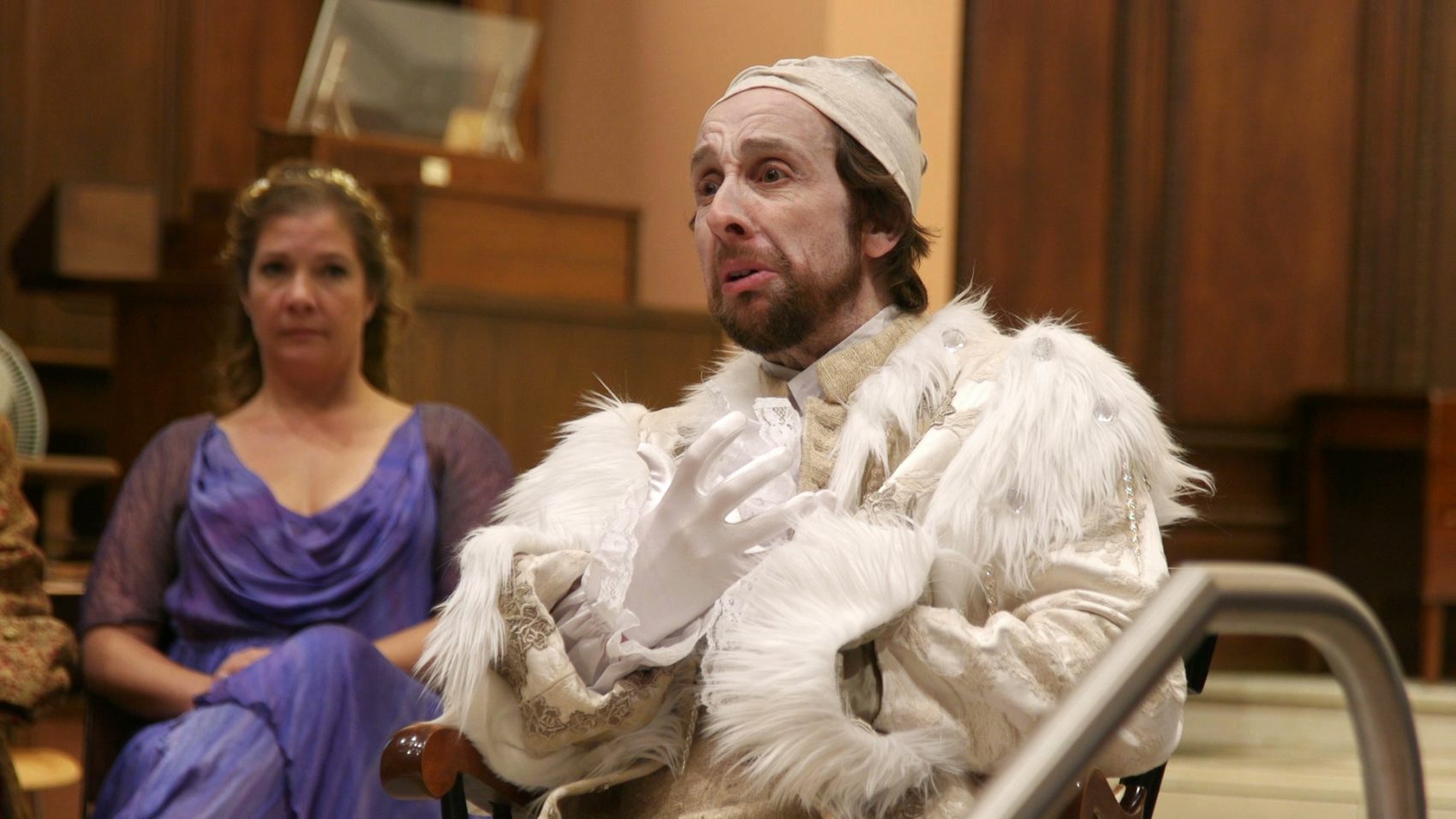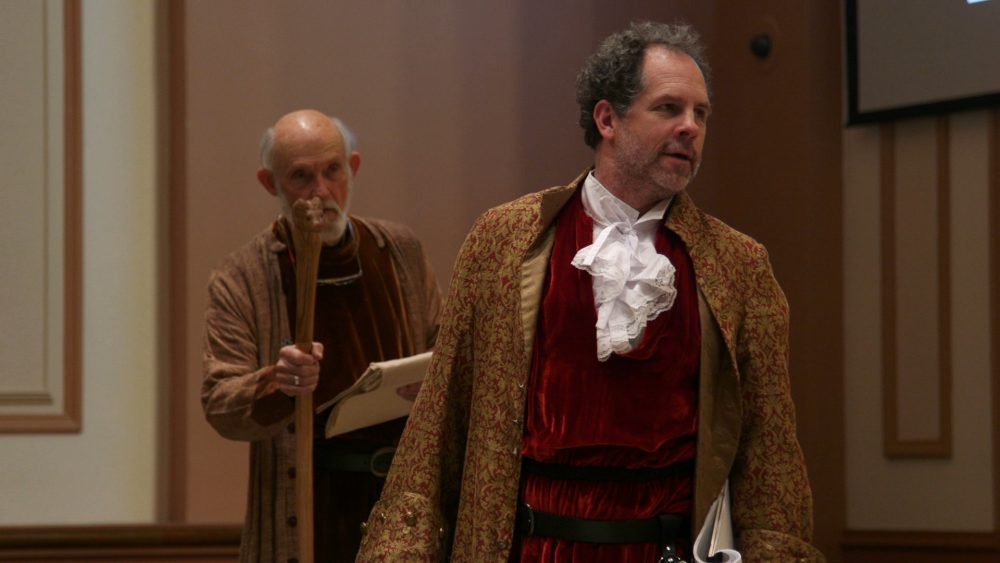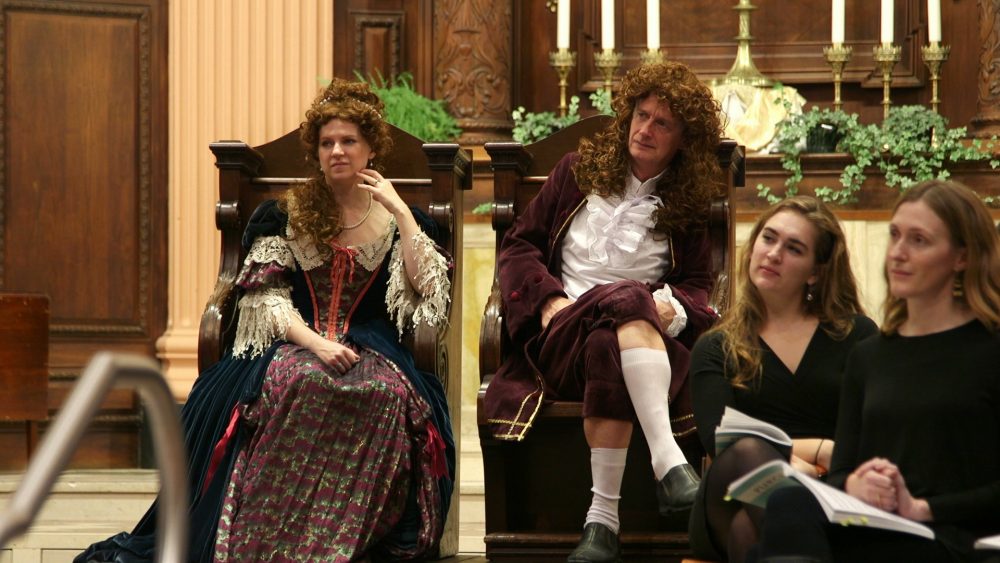Advertisement
In A Rare Staging, Poets' Theatre Revives 17th Century Semi-Opera 'King Arthur'

If John Dryden and Henry Purcell had found success together, modern ideas about opera might be very different now.
The semi-opera “King Arthur” — being staged this Saturday, Nov. 19, by a collaborative team including the Poets' Theatre, the Purcell Society of Boston and the Arcadia Players — gives us some idea of what the prolific English poet laureate and the then-young composer were up to in the late 17th century.
Part poetic libretto (Dryden), interspersed with gorgeous ensemble music and arias (Purcell), “King Arthur” was an English strain of half-sung, half-spoken musical theater that eventually gave way to the recitative/aria creations that were sweeping the continent.
Some unfortunate politics had plenty to do with it. In Charles II, Dryden and Purcell found a staunch advocate for their style of theater. But then Charles died before “King Arthur” could be staged and the production was put on hold. By the time it was staged, the Glorious Revolution had occurred, and William and Mary had taken over England. Understandably, the subtext of “King Arthur” — the overthrow of the Northern European Saxons -- did not sit well with the new Dutch rulers.
But the music survived — period recordings by John Eliot Gardiner and William Christie have kept Purcell’s score vibrant — even if staging the entire work remains a rarity. Now this collaborative effort will give Boston audiences a chance to see and hear the complete work.
Ben Evett, of the Poets' Theatre, takes on the role of King Arthur. Bob Scanlan directs, and the Arcadia Players will be led by Ian Watson. David Kravitz, Sarah Yanovitch, Krista River and Sumner Thompson will sing the solo parts under the direction of Jessica Cooper of the Purcell Society.

At the center of the story lies King Arthur’s attempt to fight off the invasion the Saxon King Oswald. Good magic and bad (yes, Merlin shows up), fair maidens and noble causes highlight the narrative.
“It’s an interesting challenge,” Evett says. “The music is fantastic, but it’s almost never performed.
Evett began discussing the staging of “King Arthur” a year and a half ago with Jessica Cooper, director of the Purcell Society. It was Cooper who suggested inviting the Arcadia Players as well: “Jessica was the one who really drove the idea,” Evett says.
“It’s a peculiar beast, let me tell you that,” he says. “It’s a romantic adventure, but it’s not like a lot of other plays. It’s stripped down to its essentials, and moves forward very quickly. The music is only loosely attached to the plot. Essentially the story goes on, and then maybe there’s this sacrifice, so they sing about it.
Advertisement
“It dates back to the idea of a masque,” he says. “A royal or noble entertainment, with a variety of different pieces — elaborate stages, costumes, even fireworks -- and these interludes for glorious music.”
The work has been updated only slightly — some cuts, Evett says, for brevity, but also introducing “a royal flavor,” as he puts it. “William and Mary will be characters of sorts. It will look sort of like a tryout for them, and we’ll put them in the audience, observing the action.
"A lot of the play was about King Arthur and his defeat of the Germanic Saxons, while in fact William and Mary were these Germanic Saxons coming into England. William actually couldn’t even speak English when he took over the throne. Historically the piece had a curious life. This will help contextualize it for the modern audience, an entry point of sorts."

By the time Dryden began work on the libretto, around 1683, he had been poet laureate for 15 years. Prolific as a poet and as a dramatist, he was accustomed to incorporating songs into his librettos. And also in pleasing Charles II, who loved poetry and music, but who also loved some risqué content as well.
“It’s certainly curious language,” Evett says of Dryden’s libretto. “Not like Shakespeare at all. There’s a fair amount of bawdiness and sexual innuendo. That would have been very popular with Charles — he was a lover of entertainment — but then was probably toned down for William.
“Whatever resonances people find are all very well and good,” he says. “Our job is to speak this remarkable language as powerfully and beautifully as we can, and to sing this music as powerfully and beautifully as we can. It’s quite a fantastical tale.”
The Poets' Theatre, in partnership with the Purcell Society of Boston and the Arcadia Players, presents “King Arthur” on Saturday, Nov. 19 at 7:30 p.m. in the Cathedral Church of St. Paul in Boston.